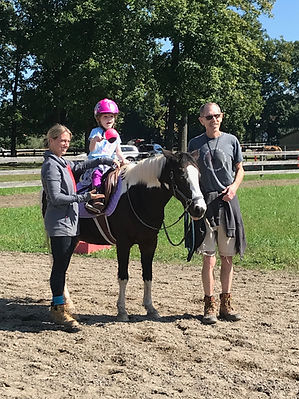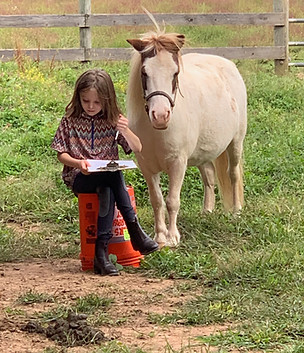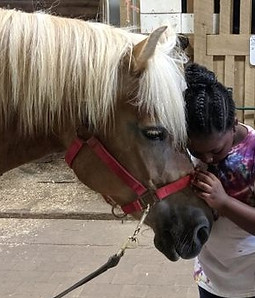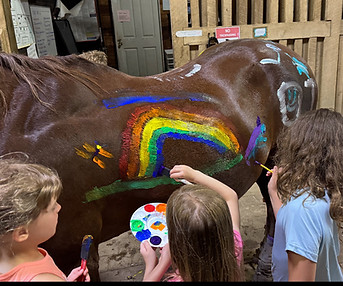Riding with HEART
Hunterdon Equine-Assisted Recreation & Therapies
EIN: 57-1233216
The mission of Riding with HEART is to improve the quality of life of physically and cognitively challenged adults, children, and their families and to provide youth development through our diverse equine-assisted programs.
Our Programs
Adaptive Therapeutic Horseback Riding
Adaptive horseback riding is a recreational activity that teaches horseback riding skills that are adapted to each individual’s abilities and goals. Lessons are fun and educational and incorporate activities that build horseback riding skills along with confidence, core strength, social skills, gross and fine motor skills, eye/hand coordination, balance, problem-solving skills, and sensory integration.
Horseback riding is inherently a therapeutic activity that uses the multidimensional movement of the horse to mimic the human gait resulting in enhanced physical strength, increased range of motion, and improved posture.
In an adaptive therapeutic horseback riding lesson, educational opportunities are incorporated using activities designed to reach their goals. If a rider’s goal is counting the instructor may have the rider play the dice game. During the dice game, the rider counts the dots, tells the horse to take that many steps then asks the horse to stop. Playing this simple game, the rider is counting with one-o-one correspondence then feeling that movement in their body and counting, using their verbal skills and horseback riding skills. Riders may have Autism, Asperger’s, Cerebral Palsy, Down Syndrome, Spina Bifida, Fragile X, developmental delays, learning disabilities, sensory processing disorder, and traumatic brain injury. Horseback riding offers benefits for every rider.

Equine-Assisted Learning
Equine-assisted-learning (EAL) is an experiential learning approach that promotes the development of life skills for educational, professional and personal goals through equine-assisted activities. In an EAL setting, the experiential approach integrates equine-human interaction to meet the identified goals or desires of the participant(s).
Equine-Assisted Learning is equally successful for individuals as it is for groups. We provide programs for summer camps, activities for Scouts and home school providers. In addition, large school groups are always invited to enjoy all we have to offer.
Working with equines provides opportunities to teach critical life skills such as trust, respect, honesty, and communication. Equines use non-vocal communication and are in-tune with human behavior. This can help participants to better understand and learn how our non-verbal communication might be impacting or influencing others in their lives.
Equines require people to be aware of their surroundings at all times. Through interactions with the equines, participants achieve heightened self-awareness. Self-awareness is important, revealing patterns of behavior and allows participants to think in a new way. Participants gain self-esteem and self-confidence while learning how to work with such a large and powerful creature.
Horses offer us the opportunity to experience humility, compassion, and challenge - all critical elements to supporting self-growth and self-awareness.

Equine-Assisted Activities & Therapies
It’s been established that the simple act of petting a horse releases the endorphins (the feel-good hormones), that counter the stress hormones of adrenalin and cortisol. Reducing those bad hormones and increasing the good hormones help improve sleep, slow weight gain, and reduce physical pain, depression, and anxiety. Adding horses to the learning or treatment team has proven successful with clients of all ages who struggle with mental, emotional, or physical illness
No matter what challenge the client is facing, there will be improvement through their interaction with horses.

Children and teenagers experiencing anxiety, depression or even engaging in self-harm can benefit from equine-assisted therapies.
Adults experiencing the negative effects of significant trauma, depression, and other mental health challenges state that the time they spend simply in the company of a horse gives them peace, relieves depression, and gives them an overall sense of mental well-being. There are measurable, positive outcomes for everyone no matter what their demographics may be. Greater mental and physical well-being for the participant is reported even after their first session.
BARN BUDDIES
Our "Barn Buddies" program caters to children ages 3-6, providing hands-on, interactive, and enjoyable activities to foster learning. During classes, children will participate in story time with the horses, crafts, play centers, indoor and outdoor activities such as parachute play, obstacle courses, nature walks, scavenger hunts, grooming and learning about horses, etc. Of course we also sneak in those important preschool and kindergarten benchmarks such as age appropriate social skills and academics!

Bravehearts Program for Vets & First Responders

The BraveHEARTs Equine-Assisted Learning Program serves members of all branches of the military, veteran and active-duty members as well as all law enforcement and first responders and their families.
The BraveHEARTs Program focuses not only on the service member or first responder but their family as well. We offer a collaborative approach towards Equine Assisted Learning with the entire family in mind. The team includes the veteran, police or first responders and their families (if they so choose), and finally the horse partner as the teacher. Horses have highly developed senses and offer a mirror into ourselves as we interact with them. The session is led by an Equine Specialist who guides the participants through the learning process safely.
Ground-work, as well as mounted activities with the horse, create a natural opportunity to overcome fear and develop self-confidence. Learning, bonding, and enjoying time within the equine/human team is the ultimate goal.
Summer Learning Programs
Our inclusive summer Learning Programs bring together children ages 5-13 with and without disabilities in unique lessons designed to promote learning, acceptance, and fun through equine-related activities.
Riders can choose from one of our unique specialty equine programs. Students will participate in daily horseback riding lessons, arts and crafts, and horsemanship activities along with activities designed for each specialized session. Team building activities include games, barn chores, and other activities that build new friendships.

Donate
